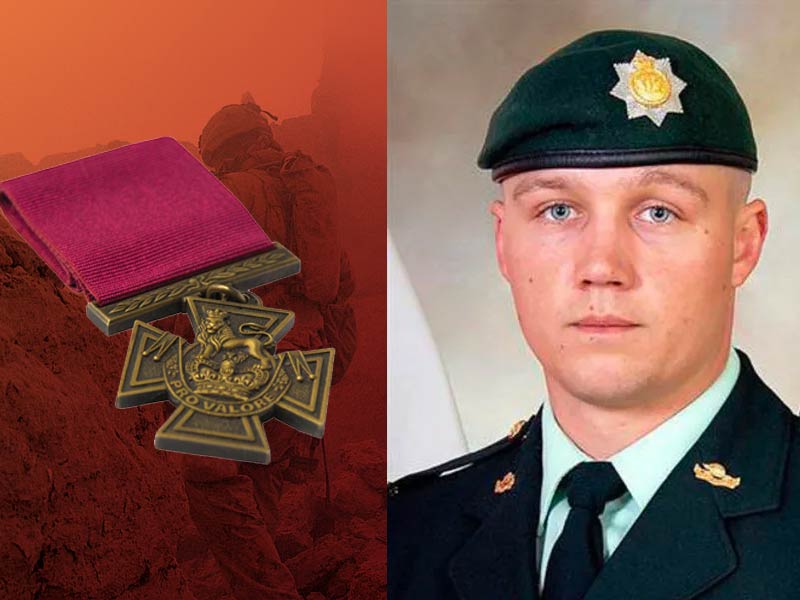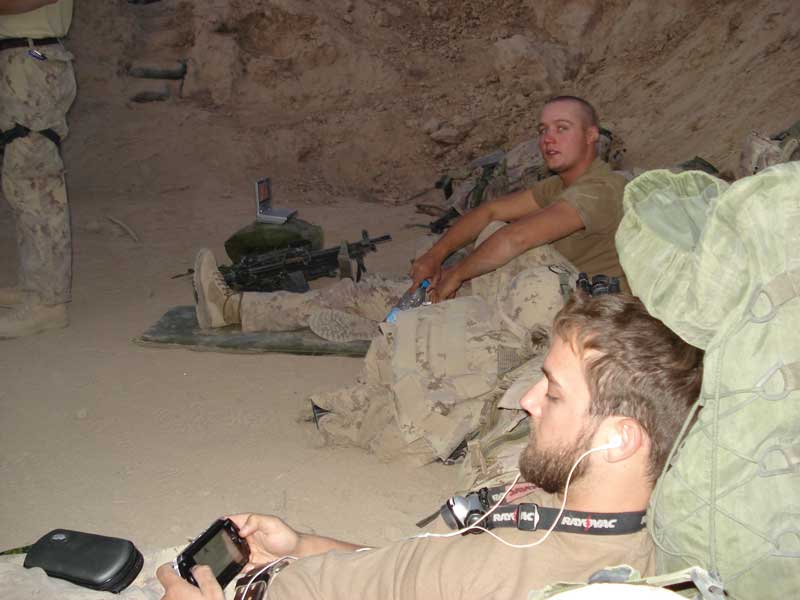
Victoria Cross Medal (left) Private Jess Randall Larochelle (right) [CORPORAL ISSA PARÉ, RIDEAU HALL © OSGG-BSGG, 2007; DND]
But the group spearheading the effort says not so fast.
Lieutenant-Colonel Carl Gauthier told Legion Magazine that hard-and-fast time limits prevent Private Jess Larochelle from becoming the first soldier to receive the Canadian VC since it was created in 1993.
Larochelle was one of 20 soldiers awarded the country’s second-highest gallantry decoration, the Star of Military Valour, for their actions in Afghanistan. Badly wounded, surrounded by dead comrades and outnumbered by the enemy, he spearheaded the successful defence of his strong point during a 2006 Taliban attack.
Valour in the Presence of the Enemy, a group headed by wounded Afghanistan veteran Bruce Moncur and fronted by a former defence chief, retired general Rick Hiller, has been fighting for several years to get Larochelle’s medal upgraded.
“There are time limits and a five-year rule applies to all honours—not only the policies to create new medals, but also to nominations,” said Gauthier, who has headed the directorate responsible for the “appropriate and timely” recognition of military personnel since 2013.

Privates Jess Larochelle and Blake Williamson in quieter times. Williamson was killed by an RPG strike at the outset of the Taliban attack. [Courtesy Jeremy Leblanc]
Furthermore, nominations for bravery decorations and valour awards in Canada must be submitted within two years of the event, and no duplicate awards are considered at all.
“So, the timelines for [Larochelle] are long-elapsed,” said Gauthier. “[Valour in the Presence of the Enemy] have been informed. They have made a proposal, but it is not in line with Canada’s policy with regard to honours.”
Moncur was told of the decision in a four-page letter from the current defence chief, General Wayne Eyre.
“In light of your correspondence, the Canadian Forces Decorations Advisory Committee examined the matter again and reaffirmed the importance of the existing practices,” wrote Eyre, with whom the final decision rested.
“Consequently, with the unanimous support of the committee and the support of Rideau Hall, I do not recommend reopening this or any other file related to the Afghanistan campaign.”
There are time limits and a five-year rule applies to all honours.
But neither Moncur nor the legions of Larochelle supporters are ready to give up the fight.
The retired Afghanistan vet, who has advocated on behalf of his brethren since recovering from head wounds suffered in a September 2006 friendly-fire attack by an American A-10 aircraft, said he has learned from his former enemy, the Taliban.
“The good analogy here is the Taliban analogy,” he said. “‘You have the watches, but we have the time.’ And that’s basically the strategy that we’re going to take. We’re going to take a lesson from the Taliban and we’re going to wait you out.
“Eventually, we’ll get there.”
The military is intransigent, he acknowledges. But the military must answer to its political masters. And while the Liberal government torpedoed a proposed motion to review the awards process last year, governments change.
Moncur says senior Conservatives have assured him that, once back in power, the party will reconsider Larochelle’s status. If not two years from now, then later.
“We’ll keep going at it; we’ll just keep plugging away,” Moncur promises. “The rules put in place are archaic. It’s super-simple to change that rule. It’s basically taking a bit of white-out and writing a new rule.”
The time-limit rule also figured in the quashing of a separate proposal from another individual to award war medals to support personnel who worked in Canada during the 12-year war.
While those serving in Afghanistan itself received campaign stars with Afghanistan ribbons and support personnel working in third countries were awarded South-West Asia Service Medals, military personnel working similar support roles in Canada received nothing.
“We don’t recognize support or service from Canada because it does not involve the challenges of a deployment overseas or the risk of the environment associated with going into an active theatre of operations,” said Gauthier.
“Even if somebody deploys to another location…to support an operation, they have to put their lives on hold, leave their family behind, pack their gear and go to an unknown, unfamiliar place and serve there for six, eight months—sometimes longer. The medal is there to recognize that special challenge that is not there when people serve in Canada.”
A similar medal was awarded to support personnel in Canada during the Second World War, but Gauthier said the circumstances were entirely different since “Canada was sort of a theatre itself because the war came to us, or certainly very close.”
The U-boat war came to the Gulf of St. Lawrence and and river itself; enemy spies were dropped on Canadian shores, German troops set up a meteorological station in Labrador and Japanese forces shelled a lighthouse on the West Coast.
“The whole country was mobilized. At one point, one million people served in uniform. We were guarding bridges, hydroelectrical stations and factories. The threat was here, which never applied in the First World War, Korean War or Afghanistan.”

Soldiers of the 1RCR Battle Group (left) pick their way through smoky ruins. [Jeremy Leblanc]
“The rules put in place are archaic.”
In his Larochelle letter, Eyre emphasized the importance of ensuring “events are judged by the standards and values of the time, are compared with other contemporary examples and that previous decisions are not second-guessed and history is not reinterpreted.”
New Zealand, which created its own VC in 1999, also respects the time limits, as does Britain, he noted.
“I have witnessed the valour of our members during my own tours in Afghanistan,” wrote Eyre. “This issue has not been an easy one, as I too wish our war could have produced a VC recipient. The same could be said for the Korean War.
“I can assure you that the recipient…did receive the appropriate recognition for their actions and services.”
Eyre did not explain the apparent diversion in the case of Korean War veterans, who did not receive a Canadian war medal until 1991, 38 years after the “police action” to stop the Communist advance on the Korean peninsula ended.
The general said he had thought long and hard over the matter, and cited some of the opinions and volumes of advice on both sides of the issue from various organizations, historians and Commonwealth partners.
One organization warned that reopening old files threatened to start “a perpetual re-examination of all sorts of awards and actions” that would ultimately devalue the entire honours and awards system.
Nevertheless, Eyre said he was assembling a panel, including outside advisers, to help “develop more precise guidelines to more clearly define the difference between the various levels of gallantry recognition available.”
In June 2022, government MPs voted down the proposed creation of a board to review historical combat actions, including Larochelle’s, with an eye to recommending VCs where it felt warranted.
Former Conservative leader Erin O’Toole drafted the detailed proposal after Moncur’s spouse, New Democrat MP Niki Ashton, tabled a petition, signed by 14,129 Canadians, calling on the government to re-evaluate Larochelle’s decorated conduct.
The petition was backed by a write-in campaign that garnered some 20,000 letters.
Nearly 100 Canadians are among the 1,353 original VCs awarded across the British Empire until the 1990s. Australia has awarded four VCs since creating its own in 1991; the Kiwis have given one. All were for actions in Afghanistan.
The last Canadian to earn a VC was Lieutenant Robert Hampton Gray, a navy pilot whose posthumous award came for actions on Aug. 9, 1945, when, under heavy fire, he led a Corsair attack on a Japanese destroyer. He sunk it with a direct hit even as his aircraft burned. The last living Canadian VC recipient was Ernest Alvia (Smokey) Smith, who earned his in 1944 in Italy. He died in 2005.
Read the article “Danger Close” about Lacrochelle’s actions here: https://legionmagazine.com/danger-close/
Advertisement





















